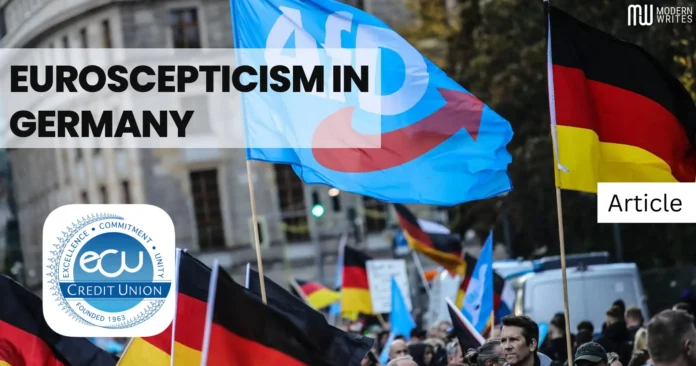Introduction
Elites led the European Unification Project, while the general public and state governments across Europe largely ignored it for a long time. However, starting in the Nineteen Nineties, the European integration effort increased from an intergovernmental to a supranational degree, leading to a greater politicization of the developing European agenda. Euroscepticism in Germany
At the equal time, “Euroscepticism” emerged as a phrase used inside the media and amongst politicians to describe the developing popular skepticism of the ECU Union. After years of “permissive consensus,” the ECU Union has shifted to “constraining dissensus.” Therefore, in recent years, the level of popular support for European integration has gained considerable relevance in determining the course of the project.
In every era following World War Two, it is clear that the German elite has been a strong advocate for European unity. A significant chasm has opened up over the years between the views of the general populace and those of the elite. In turn, this contributed to growing skepticism in Germany about the European integration effort.
Euroscepticism in Germany
Europe-skepticism has evolved very differently in the Federal Republic of Germany. The Social Democratic Party (SPD) was initially hostile to European integration in the 1950s, but it eventually became a strong advocate for the continent. German politics generally agreed that European collaboration and integration should be the primary objectives of Germany’s search for a new post-war identity. Euroscepticism is a relatively new phenomenon for Germany.
In the years leading up to the adoption of the Euro, for instance, German Euroscepticism rose significantly; this was largely the result of a contestation between German Europeanness and “Deutsche Mark patriotism” (Haselbach, 1994). The growth of the Nazi party in Germany in the years before World War II may be traced back in large part to the country’s high inflation rates and the global economic crises of the time. Thus, overcoming Germany’s nationalist and militaristic past necessitated not just expressing support for the European integration effort, but also implementing strong economic policies of low inflation and manageable budget deficits.
German economic policy was a symbol, and the strong Deutsche Mark was its physical manifestation. The resurgence of the German economy following World War II was largely reflected in the rise in the value of the Deutsche Mark.
Germans’ resistance to the Euro may be traced back to their national pride in the powerful Deutsche Mark they have created. In fact, Germans were quite concerned that the adoption of the Euro would lead to rising inflation and economic instability, which would in turn lead to a revival of the economic conditions in Germany before World War II and the country’s collective pain. Furthermore, there was widespread concern among the German public that their country would soon become the EMU’s largest net contributor, with the Union using German money to prop up economically weaker nations.
While this is true, the right-wing populist and Euroskeptic AfD (Alternative für Deutschland) party, which has been on the rise in Germany’s political scene since its April 2013 inception, has not gone unnoticed. Since its establishment in October 2014, the far-right political movement Pegida (Patriotische Europäer gegen die Islamisierung des Abendlandes) has experienced significant growth. Euroscepticism in Germany
Extremely ‘negative’ attitudes toward the European Union characterize the policies of Eurosceptic political groups like the Alternative for Germany and Die Linke. These two parties represent the far right and far left ends of Germany’s political spectrum. The rate of favourable tweets, though, was highest for the Social Democrats and the Greens.
Even traditional pro-EU parties have several members who express very critical views about the EU. Zaghi (2003) found that a larger percentage of CDU and CSU conservatives are pessimistic than optimistic (52.29% vs. 45.71%, respectively).
To a large extent, Germany was spared the worst of the current economic turmoil. The Eurozone crisis has made Germany the winner, according to some analysts. It begs the question, given Germany’s postwar prominence in Europe, why an growing percentage of Germans are turning their backs on the ECU concept. Germany’s first Eurosceptic party, the Alternative für Deutschland (AfD) has garnered considerable support in nearby, national, and EU elections.
Even before the introduction of the Euro, conservative elites in Germany consistently viewed European integration with skepticism. Understanding the recent uptick in Euroskepticism in Germany requires looking at the phenomenon in the larger context of shifting cultural norms and a dearth of viable political alternatives. An extraordinary moral panic about European bailouts and European Central Bank monetary policies facilitated the success of the AfD.
The German far-right party Alternative für Deutschland (AfD) has decided to fight for the country’s withdrawal if its demands for changes inside the EU do not materialize. This vote is the first time any political group has advocated for a “Dexit,” or a withdrawal of Germany from the European Union (EU) in the style of Brexit. Delegates at a party conference in the eastern state of Saxony agreed on a draft manifesto for the next European Parliament elections, which calls for Germany to quit the union if the EU does not change in accordance with the party’s principles “in an appropriate timeframe.”
European Parliament
The European Parliament, for which AfD candidates will be campaigning this spring, was also the target of a request to abolish it that was approved by the congresses. The article criticized the “751 privileged members” of the current European Parliament and said that “we see nation-states as having the exclusive competence to make laws” (The Guardian, 2019). Euroscepticism in Germany
Germany has long been the de facto head of a bloc inside a bloc, providing political and economic clout to the EU’s Central and Eastern European member states while also serving as a patron and source of patronage. German pressure on Poland, Hungary, and other EU members was often necessary to get them on board with Brussels’ plans.
Now, if Germany had been to quit the EU, this could have essential and some distance-accomplishing consequences for the stableness and stability of strength in Europe and the global geopolitical order. One have to keep in mind, but, that that is simplest a hypothetical situation and that the real effects would depend upon a myriad of political, economic, and army variables. Euroscepticism in Germany
Whilst Germany, one of the global’s finest economies, decides to leave the European Union (EU), it would have a profound impact on the bloc’s financial and political stability. There may be extreme consequences for the EU’s price range and change ties if Germany stops making financial commitments and stops having access to EU markets. Leaving the ECU would be a chief blow to Germany’s economic system and could result in political and economic conflicts among other member nations.
In addition, Germany’s go out from European may have a long way-accomplishing geopolitical effects, starting the door for different international powers to boom their influence in Europe. New alliances and partnerships among European countries may additionally stand up as a result, which may regulate the continent’s political and monetary structure.
Conclusion Euroscepticism in Germany
Rather than adopting a pessimistic stance towards the EU and fundamentally opposing parties such as the AfD, as some have proposed, we ought to send a message and initiate an impartial conversation about the EU’s future, incorporating all parties and viewpoints. This step is the only way to show Europeans that we are listening to their complaints. One must not dismiss any criticism or demonize those who hold eurosceptical views in general. Mutual comprehension is more likely to result from sustained communication and robust debate.
We urge European leaders to engage Eurosceptic in dialogue, arguing that they are mistaken to view renationalization as the solution to the world’s problems. In a society experiencing fundamental changes, it is crucial to provide residents with a sense of stability and security while remaining open and honest about the challenges that may arise. When there is a lack of trust amongst Europeans, Euroscepticism flourishes. Therefore, the EU must commit itself to collective, solidary solutions, especially in trying times like the epidemic, to revitalize the fundamental concept of Europe.





